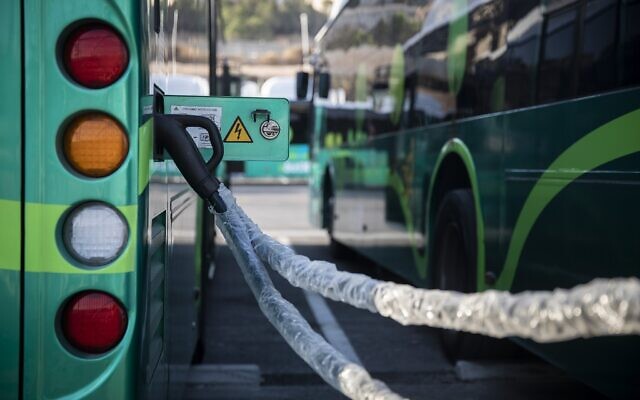Israel projects that 1.3 million vehicles on its roads will be electric by 2030 taking up a 30 percent share of the auto market as the country seeks to cut down on air pollution and carbon emissions, the Energy and Infrastructure Ministry said on Tuesday.
The forecast is part of the government’s ambitious plan to advance the gradual shift from cars powered by polluting fossil fuels to electric vehicles and green transportation, including trucks, buses and trains.
By 2050, the government aims for all six million private vehicles in use to be electric. There are currently 70,000 electric vehicles in use on Israel’s roads, accounting for less than 2% of all cars.
According to the forecast, the number of electric buses is expected by 2030 to increase to about 8,000, or about 35% of all buses, before the full transition in 2050 to electric or hydrogen-powered buses.
The growing adoption of EVs and the widespread shift to green transportation is expected to weigh on Israel’s future demand for electricity. While today the transportation sector consumes less than 1% of the country’s electricity demand, by 2030 it is expected to make up about 6% of total demand, according to ministry estimates. With the goal of fully integrating EVs into the nation’s electricity grid, it is projected to account for 15% of total demand in 2050.
Current consumption for charging plug-in private vehicles amounts to about 0.3 terawatt hour (twh) per year. To meet the ministry’s goal for the full transition in 2050, electricity supply for charging private EVs will need to reach about 14 terawatt hours, according to the forecast.

Egged’s new electric buses at their charging station in Jerusalem during the launching ceremony, on September 3, 2019. (Hadas Parush/Flash90)
“Our forecast will help the market and the electricity sector to prepare for the clean transportation revolution and will be a key tool for government ministries in the advancement of this field,” said Ron Eifer, sustainable energy division head at the Energy Ministry. “The transition to electric transportation is one of the most significant steps in the transition to a clean, efficient and emission-free energy economy and a major step in the fight against the climate crisis.”
“We will continue to accelerate the transition to electric transportation of the entire population, all over the country, by adjusting and simplifying regulation and promoting competition in this market,” Eifer added.
Over the past decades, Israel has consistently failed to meet its own targets for renewable energy. These were to generate 10% of energy from renewable sources by 2020 — a figure the ministry barely scraped by the end of last year — with the goal being to reach 30% by 2030.
In a recent report, Israel scored poorly on a range of environmental issues compared to other members of the 38-member Organisation for Economic Co-operation and Development. The report showed that Israel is behind on its targets to reduce global warming emissions by 2050. On green transportation, it was recommended that the government speed up investment in charging infrastructure to encourage the transition to the usage of EVs.
Although the government has invested in some efforts to incentivize the electric vehicle market, it has been lagging behind in the formulation and implementation of a comprehensive electric vehicle charging infrastructure plan. That would include a nationwide layout and the necessary regulation for charging infrastructure and points in residential buildings and public areas.
The Energy Ministry said Tuesday that is working to significantly increase the number of public charging stations in Israel by 2030. To power public charging stations in 2030, 1.3 million kilowatts will be needed, which is ten times the current battery charging capacity, according to the ministry.
In recent years, the government has invested NIS 70 million ($18 million) to install a total of 1,500 slow and fast EV charging stations throughout the country. For the years 2023-2024, the government allocated a budget of over NIS 60 million to support the creation of thousands of additional charging points, in particular in areas of the country where there is a shortage.



